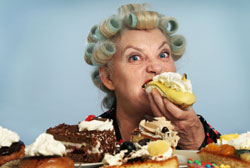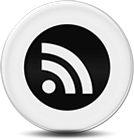Weight Loss After Menopause
If you are after menopause you may have found that you are gaining weight more easily. That is a common problem for many women.

Your hormones are the master control for your metabolism. When the hormones are decreased your metabolism is decreased.
Weight gain is not inevitable. But it is more likely, especially if you had trouble with your weight before.
Low calorie diets after menopause
Many women turn to extreme low calorie diets to lose weight after menopause. After all, it seems like the diet must be the problem.
The reasoning is that if you gain weight with your usual diet, you should be able to take the weight off with a lower-calorie diet.
Have you tried that? If you did you probably found it didn't work.
Why didn't the diet work?
Low calorie diets don't work well after menopause. Why? Because you are already having a problem with your metabolism.
Metabolism is the sum of all the actions of all the cells in the body.
The cells are not as active. They aren't burning up as much energy. So you burn fewer calories. And you tend to gain weight.
Well, when you diet, what happens? Your metabolism slows down even more. You really can live on very little food when you have a slow metabolism. How little? Well, you've probably seen it already. Very little.
Lots of women after menopause eat less and less. Salads only. Or one meal a day. Expensive pre-packaged foods. And they get nowhere.
Is weight loss impossible?
Weight loss after menopause isn't a simple problem. There isn't an easy solution. There is no "easy, fast weight loss" after menopause.
But it's not impossible either. If you follow the recommendations on this page you'll be able to have a body you are happy with.
Find your real calorie requirements
So where do you start? First, you need to figure out how many calories you really burn in a day. You can use this calculator to find out.
It's not exact, but it gives you a pretty good starting point for your diet after menopause. You can make adjustments as your track your progress.
Next, you need a food scale, and you need to weigh your food. Sure it's some work to weigh your food.
You might not like the idea. But what's it worth to you? A lot. You should just do it.
Eliminate non-productive calories
Cut out all the excessive fruit from your diet. An apple a day is fine. Drinking a lot of juice is not a good idea.
Stop drinking sodas. That includes diet soda. Diet soda causes cravings for sweets. And it's full of chemicals that you don't need.
No artificial sweeteners. None. Not in your coffee. Not in anything. Need something to sweeten your coffee or tea? Try sugar. A teaspoon has 15 calories. You can have 2 teaspoons a day. That's more than enough.
These things don't contribute to a strong body. Get rid of them.
Shift from calorie dense foods to nutrient rich foods
Don't eat in restaurants. You can easily get 1500 calories from a single restaurant meal.
Don't eat packaged foods. No matter whether it's "low-calorie" or "low-fat" or "low-carb" or "diet" or "healthy." Forget it. No packaged foods.
You need protein every time you eat. Protein will increase your metabolism. It has a special property that revs up your metabolism every time you eat it. So have at least a couple bites of protein every 3 hours or so. You'll see a difference.
Exercise after menopause -- exercise intensity
You can exercise after menopause. And you can exercise hard, too. There's still a lot of life in you, even though it might not feel that way at times.
I see old grandmothers lifting weights. And improving their life with it.
If they can do it, you can do it too. They make 1 pound weights you know.
You have to work out hard to get any results. Are your arms flabby? What about your hips? Belly? Then you need to get some muscle developed.
Resistance exercise
You need resistance exercise. That means lifting weights.
Or if you can't get to a gym it means exercise bands. They're not expensive. But the gym is better.
You need a plan for exercise. You have to know what exercises you are going to do before you get to the gym. The repetitions. The sets.
You need to keep track of your exercises. Record your progress. Write it down. Make sure that the next workout you do more than you did this workout.
Cardio exercise
You need some cardio. You probably can't keep weight off without it.
Did you tend to be heavy before menopause? Are people in your family heavy? Then you need even more cardio.
What kind? Run if you can. If you can't run then walk fast. Outdoors. Not on a treadmill. If you can't run do a stairmaster at the gym.
Or even better do the crosstrainer. The crosstrainer works the upper body and the lower body at the same time.
If you can do any of that, perhaps because of bad joints, then you can swim.
But I can't do it!
Do you think you can't do any of these things? Then put your thinking cap on and figure out something that you can do. And if you still can't come up with anything then you need to keep working at it until you come up with something. There is something that you can do.
You can always come up with reasons why you can't exercise. Or reasons why it's not necessary. We call those reasons "excuses." Excuses and reasons why you can't do things won't get you to your goal.
The key is persistence
Keep working at it. Don't give up. It won't come easily. And it won't come fast.
But if you do everything I've outlined here you will get results. You might need to do some adjusting. And you might need to work at it harder at your exercise after menopause than you think you should. But that's how life is sometimes.
If you keep at it you will be able to succeed, no matter what condition you are in right now.
A source for more help
By the way, if weight loss is important to you and your life, you should get a copy of my program Dr. Dan's Super Weight Loss Plan.
It gives you everything you need to know to lose weight and keep it off. It gives you more information on all the things we've outlined here, plus hundreds more tips that you can use to have the body you want. Order it today. You'll be glad you did.
Popular articles:
With weight loss, knowledge is power...
If you know these few truths on this page -- and if you apply them consistently in your life...
If you can't stay on it forever and be fit and healthy and strong -- then it's an extreme diet.
Here's the easy way to ruin any slightest chance you have of losing weight...
Can you eat in restaurants and still respect yourself in the morning?
Calorie density is the difference between vegetable soup and a bagel.
Hidden calories that ruin your waistline...
Will it really help to drink water to lose weight?


